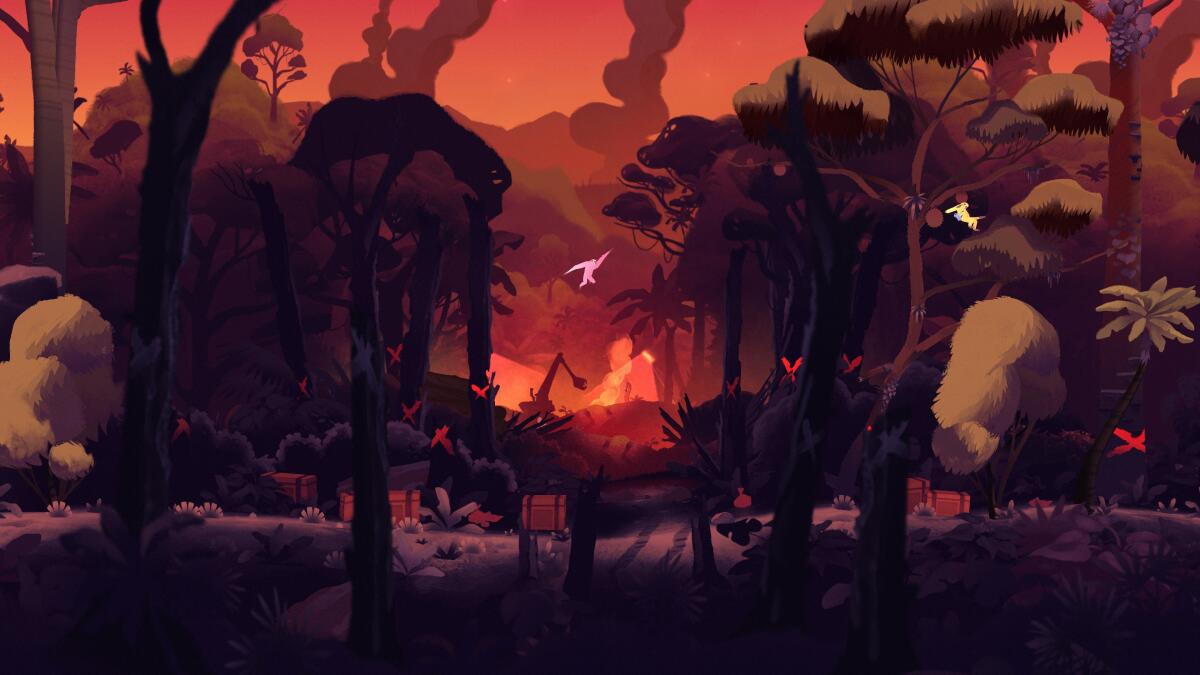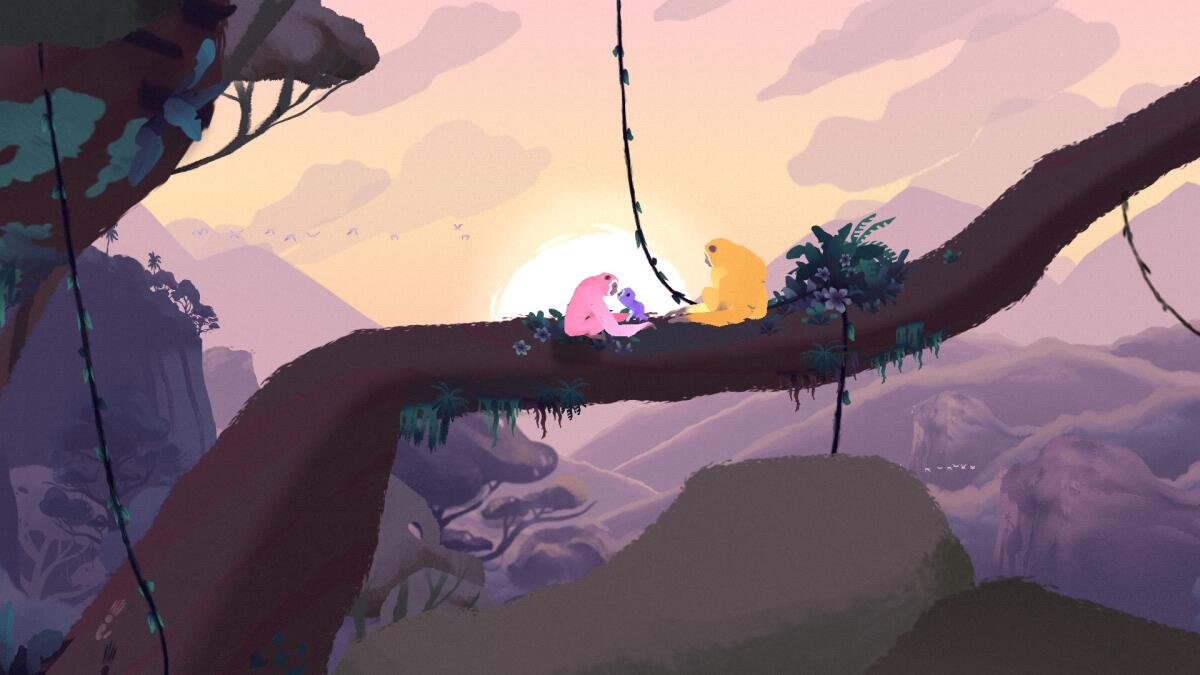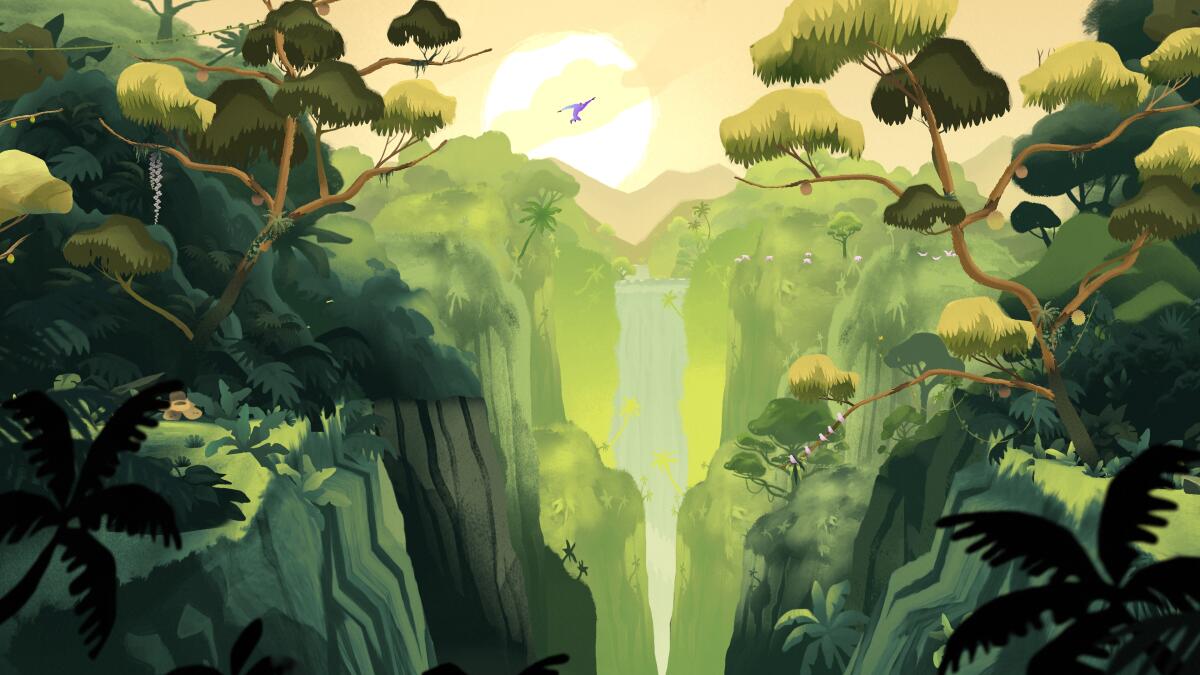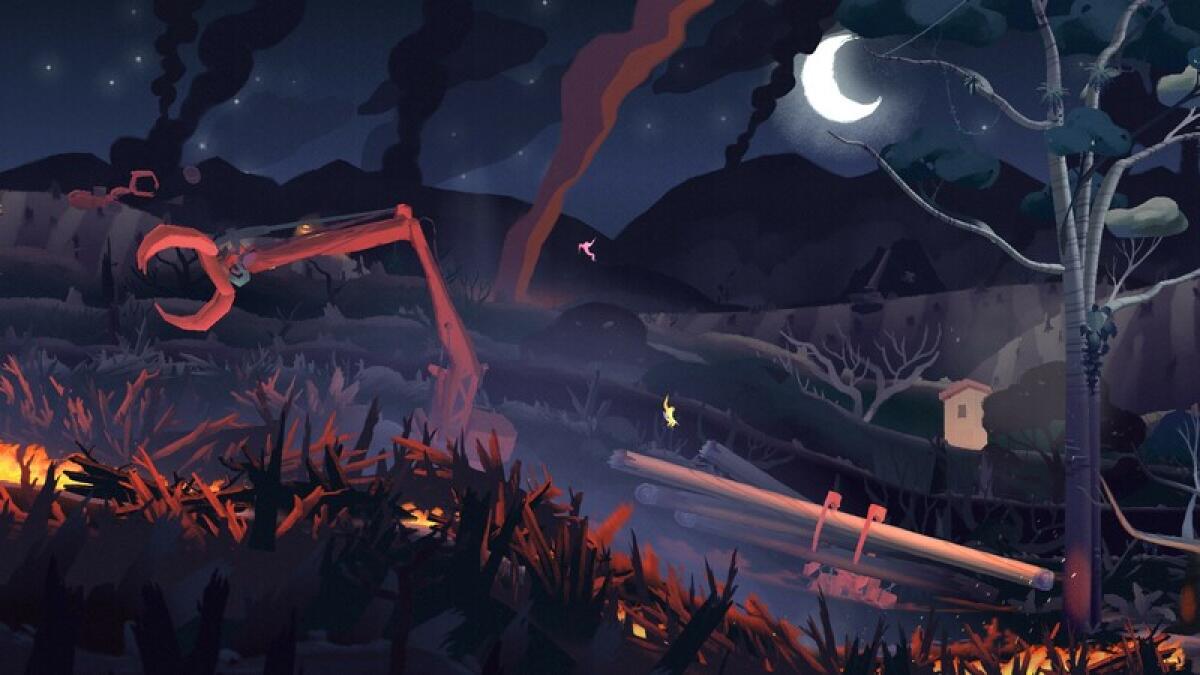They wanted to make a cute game about gibbons. Then they learned the reality

- Share via
A cute game inspired by the behavior of gibbons at the local zoo was what Felix Bohatsch wanted to make. Life in the 2020s, however, has a way of complicating things.
After completing a little research into the modern life of apes, suddenly an adorable game about gibbons swinging rapidly among the trees felt disingenuous. The International Union for Conservation of Nature has declared that gibbons are “one of the most threatened families of primates,” with more than 14 species listed as either endangered or critically endangered. Such knowledge would inform the eventual game, “Gibbon: Beyond the Trees,” resulting in a work that, developed initially for Apple’s mobile devices, starts as a calming jaunt among a Southeast Asia jungle and soon transitions to one full of real-life threats.
But “Gibbon: Beyond the Trees” is no slogging game of edu-tainment. Inspired by swift, action-focused titles, such as the snowboarding game “Alto’s Adventure,” “Gibbon: Beyond the Trees” places the emphasis on gliding, swinging, jumping and soaring among its landscapes, gradually bringing in topics of conservation via the various threats gibbons face to their habitats and their livelihood. There is a serious message to the game, and it’s one delivered as something of a call to action. The game asks players to think more broadly about our world and who we share it with, rather than hitting us over the head with a weighty thesis.
So yes, it’s a game with a lesson, but one that never loses sight of the majesty of an animal in nature. “I was just really inspired by their elegance,” says Bohatsch of gibbons, who leads the Vienna-based game studio Broken Rules. “Especially when they jump from tree to tree. They do these really high jumps into the canopies. That’s where it started. I have three kids so I’ve been to the zoo quite a few times, and gibbons are one of my favorite animals there.”

“Gibbon: Beyond the Trees” is available for Apple Arcade, the mobile giant’s $4.99 monthly subscription service, as well as home computers and the Nintendo Switch. It’s one of a relatively rare crop of mainstream games to deal head-on with environmental concerns — 2020’s aquatic docu-game “Beyond Blue” also comes to mind — but there’s a part of me that hesitates to play up the game’s conservation themes for fear it will turn off potential players. When describing the game to friends, I’ve been met with questions as to whether the game is depressing. I never felt that way while playing.
That’s because “Gibbon: Beyond the Trees” is a game of forward momentum, albeit one that strives to balance a sense of freewheeling above and through trees with a deeper meaning. “Most games — or the games that we are interested in, are not about simulation,” Bohatsch says. “They’re trying to focus on a certain feeling. But during our research we discovered gibbons are very endangered, and their habit is being actively destroyed by humans. So very soon it was clear to us that we couldn’t build a pure escapism thing.”
Yet that’s also not necessarily in the studio’s DNA. “Gibbon: Beyond the Tree” is the firm’s follow-up to 2017’s “Old Man’s Journey,” a meditative puzzle-based adventure exploring life’s memories and its lost loves and poignant regrets. Weighty subjects too and the reason why “Gibbon” was initially envisioned as a more lighthearted palate cleanser. Once the studio better understood the current reality facing the imperiled species, Bohatsch and the Broken Rules team faced a challenge: How to maintain the simple, fast, approachable and, well, fun mechanics of the game while also doing justice to real-world facts?
“We were afraid of people backing off if they hear it’s about ecological environmental issues,” Bohatsch says. “We wanted people to get into the game because of the way it looks, and then show them the issues. We changed that a bit because we realized this angle is an important part of the game. We realized these issues and deforestation make the game unique, but also they’re an integral part of the game. So we now call it an ecological adventure.”

We start in lush forest landscapes and glide among Indigenous cultures that seek to live in harmony with nature. Soon, however, we are running and jumping among metal framed houses as deforestation threatens the habitat. Things do get bleaker, but our pink, blue and yellow gibbons — there are some creative liberties taken, of course — never slow down. Playing on an iPhone, my hand rarely left the screen throughout the 60-minute-or-so experience, and it was always a joy to direct my gibbon to flip or slide through the colorfully inviting images.
Chapter transitions are typically punctuated by one of the gibbons stopping and calling attention to the environment. Perhaps a fire in the distance or looming construction equipment. Things do get more tense as the game progresses, as the gibbons become hunted, such as a sad nod to news reports of young primates being ripped from the families to be used as a tourist attraction. Moving fast and staying above ground can often lead the gibbons to safety, but expect the game’s latter chapters to provide a challenge, as poachers will chase our heroic animals amid terrain largely devoid of trees. Avoiding the paved or dirt roads below our gibbon is far from easy.
To keep the emphasis on the story, the team wanted to avoid gamelike trappings such as points or scores. It’s never about bettering your previous run through the forest. The game is always about leading gibbons to safety. Here, Bohatsch called upon lessons learned from prior games. While he cites “Alto’s Adventure,” a work that gave snowboarding a dapper makeover, as one of his favorite games, he felt its emphasis on points and collecting coins or llamas a slight distraction from his primary interests.
“I wanted to know more about the characters,” Bohatsch says. “I wanted to know what this world is actually about. At the end, you’re hunting high scores. I think in the end that ends up being empty, and I say that while I completely adore ‘Alto.’ But for us, the challenge was how can we combine a flow-based movement system and getting people into the flow and a nice movement system, but use a narrative like we learned with ‘Old Man’s Journey.’ Get rid of high scores. That was a design challenge.”

It succeeds, and not just because of its intuitive gameplay mechanics, which work especially well on the touch screen of a smartphone. Tonally, the game goes through multiple shifts in its relatively breezy run time, using its musical score as a way to not heighten tension but to telegraph emptiness. Notes disappear as trees dwindle, creating a sensation that the natural world is becoming more hollow. Construction cranes loom like bright red monsters that pierce what would otherwise be a serene, moonlit sky. And poachers arrive like joyriding fools oblivious to the natural grace of the gibbons.
To ensure the game stayed as true as possible to actual afflictions that are threatening the gibbon population, and since the COVID-19 pandemic meant a trip to Southeast Asia was not in the cards, the team consulted with a number of nonprofits. Working, for instance, with gibbon rehabilitation groups in Thailand altered the story of the game. Specifically, “Gibbon: Beyond the Trees” became a rescue mission to save a young gibbon, the latter an addition that came solely via the team’s research.
“We changed things,” Bohatsch says. “In the beginning, ‘Gibbon’ was about two gibbon friends. We didn’t want to focus on family after ‘Old Man’s Journey.’ But we learned that gibbons live in close intimate family groups. More importantly, we learned that if they’re being poached, they’re being poached for the baby. Sometimes they get shot by illegal loggers for their meat, but more often they’re being shot for cute baby gibbons. This is a recent phenomena. It’s because tourists like to take photos with cute baby gibbons, which is horrible. It’s absurd. That connected with us because it showed us that this is an international, global thing.”
These heartbreaking realities also persuaded the team that they were on the right track, that their initial game idea of gibbons taking flight among trees could become a game with heft that the studio could rally behind. Bohatsch says the interactivity of games make them a communication tool with their audience and to that end, one better have something worthwhile to say.
“I think that every game is political,” Bohatsch says. “They all take a stance. Through design choices, every game developer makes a point about the world and human conditions. Even if some developers try to be apolitical, it’s not possible. Knowing this, we want to try to design games about things that are important. Also, games are complicated to do and hard work and take a lot of time, effort and money. So let’s use it for something valuable. Escapism is fine sometimes, but even games that are about escapism you make choices that influences the way players look upon the world.”
Bohatsch says the studio is also conscious of the fact that games require a learning curve, not just for the development team but for players as well, who will have to learn how a new game thinks and behaves in order to complete it. They require a greater commitment than more passive entertainment.
“I have three kids, and I’m very conscious of our audience’s time and effort. I know how hard it is for me to find the time and energy to play games. I rarely have the time and energy, so I want to make games for people like myself. We want to give you food for thought. We try to make games that linger in our players’ minds.”
Gibbon: Beyond the Trees
More to Read
The biggest entertainment stories
Get our big stories about Hollywood, film, television, music, arts, culture and more right in your inbox as soon as they publish.
You may occasionally receive promotional content from the Los Angeles Times.











